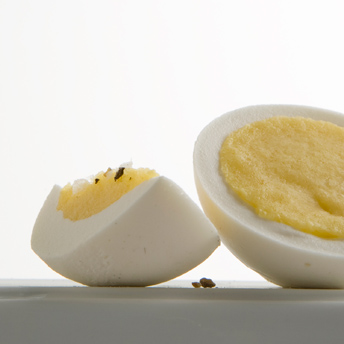 Today, we made 36 hard boiled eggs for Passover (we are going to a Passover seder tomorrow night and bringing eggs, and we hard-boiled the eggs for our seder on Tuesday night (plus a few extra for the chicken liver)
Today, we made 36 hard boiled eggs for Passover (we are going to a Passover seder tomorrow night and bringing eggs, and we hard-boiled the eggs for our seder on Tuesday night (plus a few extra for the chicken liver)
Because we are who we are, we decided to use a little science and a little competition to see which was the best egg recipe.
We used two separate methods to boil the eggs.
(We have been in pursuit of the perfect hard-boiled egg for some time)
On the right side of the stove, I used the epicurious recipe
Put eggs into a 1-quart saucepan, then add enough cold water to cover them by 1/2 inch. Bring water to a boil over high heat, then reduce heat to moderately high and cook eggs at a gentle boil, uncovered, 10 minutes. Pour off hot water. If using eggs right away, shake pan gently so eggs bump into one another (to crack shells). Run cold water into pot to stop cooking. Let eggs stand in cold water 15 minutes, adding more cold water or ice to keep water cold.
On the left side, Stephanie used the Julia Child Perfect Hard-Boiled Egg Recipe (courtesy of Recipesource.com)
The Perfect Hard Boiled Egg
Recipe By : Julia Child, “The Way to Cookâ€
Serving Size : 1 Preparation Time :0:40
Categories : Cheese/Eggs Family Recipes
Amount Measure Ingredient -- Preparation Method
-------- ------------ --------------------------------
For 1-4 Eggs:
1 to 4 Eggs
2 quarts water -- * see note
For 12 Eggs:
12 Eggs
3 1/2 quarts water -- * see note
For 24 Eggs:
24 Eggs
6 quarts water -- * see note
Special Equipment_________________________
High (not wide) Saucepan with cover
Bowl w/ice cubes & water (large enough to
completely cover eggs)
*note: water should cover the eggs by 1 inch, so use a tall pan, and limit
cooking to 2 dozen eggs at a time.
1. Lay the eggs in the pan and add the amount of cold water specified. Set
over high heat and bring just to the boil; remove from heat, cover the pan,
and let sit exactly 17 minutes.
2. When the time is up, transfer the eggs to the bowl of ice cubes and
water. Chill for 2 minutes while bringing the cooking water to the boil
again. (This 2 minute chilling shrinks the body of the egg from the shell.)
3. Transfer the eggs (6 at a time only) to the boiling water, bring to the
boil again, and let boil for 10 seconds - this expands the shell from the
egg. Remove eggs, and place back into the ice water.
Chilling the eggs promptly after each step prevents that dark line from
forming, and if time allows, leave the eggs in the ice water after the last
step for 15 to 20 minutes. Chilled eggs are easier to peel, as well.
The peeled eggs will keep perfectly in the refrigerator, submerged in water
in an uncovered container, for 2 to 3 days.
- - - - - - - - - - - - - - - - - -
NOTES : The perfect hard boiled egg has a tender white, and a yolk properly
set. There is not the faintest darkening of yolk where the white encircles
it (a chemical reaction caused by too much heat in the cooking process).
Eggs cooked this way can also be peeled neatly.
The system described here, developed by the Georgia Egg Board, takes a bit
of fussing - but it really does produce an absolutely Perfect Hard Boiled Egg!
So whoever won, the whole thing was a nice little re-affirmation of our marriage.
AND THE WINNER IS….
Actually, both methods produced easily peeled and delicious hard-boiled eggs. And strangely, they both took the same amount of time. We let the eggs stay cold a little longer than the recipes said before testing them, and the sacrificed eggs were equally delicious.
I think based on ease of use, I’m going to stick with epicurious (until I find a better method.)
Stephanie wants to stick with Julia Childs, because the instructions are so specific.
Happy Passover, Everybody. And may you eat lots of hard-boiled eggs in good health.
(Strangely, I didn’t think to photograph the great egg-race until it was over….)
Leave a Reply